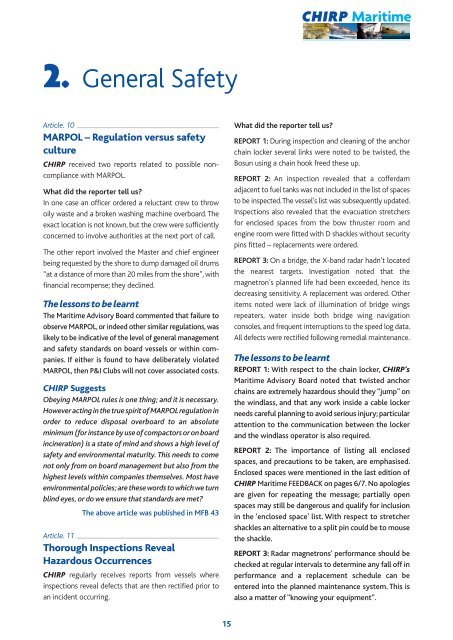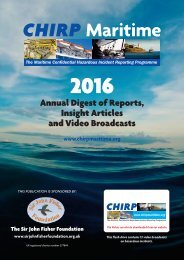CHIRP annual digest 2016 6th
Create successful ePaper yourself
Turn your PDF publications into a flip-book with our unique Google optimized e-Paper software.
<strong>CHIRP</strong> Maritime<br />
2. General Safety<br />
Article. 10<br />
MARPOL – Regulation versus safety<br />
culture<br />
<strong>CHIRP</strong> received two reports related to possible noncompliance<br />
with MARPOL.<br />
What did the reporter tell us?<br />
In one case an officer ordered a reluctant crew to throw<br />
oily waste and a broken washing machine overboard. The<br />
exact location is not known, but the crew were sufficiently<br />
concerned to involve authorities at the next port of call.<br />
The other report involved the Master and chief engineer<br />
being requested by the shore to dump damaged oil drums<br />
“at a distance of more than 20 miles from the shore”, with<br />
financial recompense; they declined.<br />
The lessons to be learnt<br />
The Maritime Advisory Board commented that failure to<br />
observe MARPOL, or indeed other similar regulations, was<br />
likely to be indicative of the level of general management<br />
and safety standards on board vessels or within com -<br />
panies. If either is found to have deliberately violated<br />
MARPOL, then P&I Clubs will not cover associated costs.<br />
<strong>CHIRP</strong> Suggests<br />
Obeying MARPOL rules is one thing; and it is necessary.<br />
However acting in the true spirit of MARPOL regulation in<br />
order to reduce disposal overboard to an absolute<br />
minimum (for instance by use of compactors or on board<br />
incineration) is a state of mind and shows a high level of<br />
safety and environmental maturity. This needs to come<br />
not only from on board management but also from the<br />
highest levels within companies themselves. Most have<br />
environmental policies; are these words to which we turn<br />
blind eyes, or do we ensure that standards are met?<br />
The above article was published in MFB 43<br />
Article. 11<br />
Thorough Inspections Reveal<br />
Hazardous Occurrences<br />
<strong>CHIRP</strong> regularly receives reports from vessels where<br />
inspections reveal defects that are then rectified prior to<br />
an incident occurring.<br />
What did the reporter tell us?<br />
REPORT 1: During inspection and cleaning of the anchor<br />
chain locker several links were noted to be twisted, the<br />
Bosun using a chain hook freed these up.<br />
REPORT 2: An inspection revealed that a cofferdam<br />
adjacent to fuel tanks was not included in the list of spaces<br />
to be inspected. The vessel’s list was subsequently updated.<br />
Inspections also revealed that the evacuation stretchers<br />
for enclosed spaces from the bow thruster room and<br />
engine room were fitted with D shackles without security<br />
pins fitted – replacements were ordered.<br />
REPORT 3: On a bridge, the X-band radar hadn’t located<br />
the nearest targets. Investigation noted that the<br />
magnetron’s planned life had been exceeded, hence its<br />
decreasing sensitivity. A replacement was ordered. Other<br />
items noted were lack of illumination of bridge wings<br />
repeaters, water inside both bridge wing navigation<br />
consoles, and frequent interruptions to the speed log data.<br />
All defects were rectified following remedial maintenance.<br />
The lessons to be learnt<br />
REPORT 1: With respect to the chain locker, <strong>CHIRP</strong>’s<br />
Maritime Advisory Board noted that twisted anchor<br />
chains are extremely hazardous should they “jump” on<br />
the windlass, and that any work inside a cable locker<br />
needs careful planning to avoid serious injury; particular<br />
attention to the communication between the locker<br />
and the windlass operator is also required.<br />
REPORT 2: The importance of listing all enclosed<br />
spaces, and precautions to be taken, are emphasised.<br />
Enclosed spaces were mentioned in the last edition of<br />
<strong>CHIRP</strong> Maritime FEEDBACK on pages 6/7. No apologies<br />
are given for repeating the message; partially open<br />
spaces may still be dangerous and qualify for inclusion<br />
in the ‘enclosed space’ list. With respect to stretcher<br />
shackles an alternative to a split pin could be to mouse<br />
the shackle.<br />
REPORT 3: Radar magnetrons’ performance should be<br />
checked at regular intervals to determine any fall off in<br />
performance and a replacement schedule can be<br />
entered into the planned maintenance system. This is<br />
also a matter of “knowing your equipment”.<br />
15



